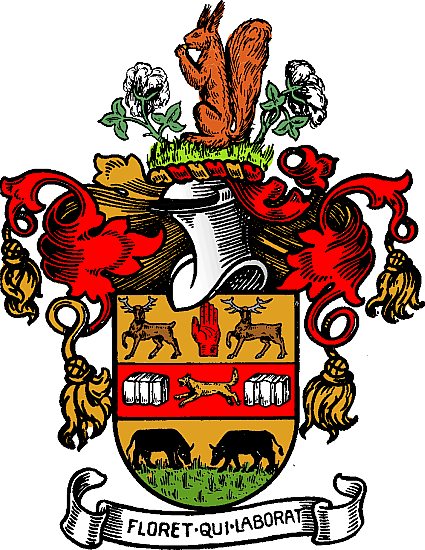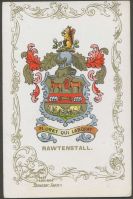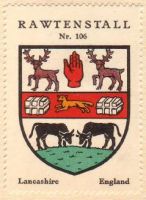Rawtenstall: Difference between revisions
Knorrepoes (talk | contribs) |
Knorrepoes (talk | contribs) m (Text replacement - "↵↵<gallery widths=250px heights=200px perrow=0>" to " ===Image gallery=== <gallery widths=250px heights=200px perrow=0>") |
||
| Line 19: | Line 19: | ||
The cows represent agriculture; the Borough includes a former hamlet called Cowpe, anciently Cowup, said to have been a place in the uplands where cows used to graze. The cotton and woolpacks stand for modern industries. | The cows represent agriculture; the Borough includes a former hamlet called Cowpe, anciently Cowup, said to have been a place in the uplands where cows used to graze. The cotton and woolpacks stand for modern industries. | ||
===Image gallery=== | |||
<gallery widths=250px heights=200px perrow=0> | <gallery widths=250px heights=200px perrow=0> | ||
File:Rawtenstall2.jpg|alt=Arms (crest) of Rawtenstall|The arms in 1896 | File:Rawtenstall2.jpg|alt=Arms (crest) of Rawtenstall|The arms in 1896 | ||
Revision as of 08:19, 3 September 2023
| Heraldry of the World |
| British heraldry portal Civic heraldry of the United Kingdom |
|
RAWTENSTALL
Incorporated into : 1974 Rossendale
Official blazon
Arms : Or on a Fesse Gules between two Stags trippant at gaze in chief proper and a Mound in base Vert thereon two Cows grazing and respecting each other Sable a Wolf courant of the first between two Bales of Wool of the third in the chief point a sinister Hand couped at the wrist of the second.
Crest : On a Wreath of the Colours upon a Mount a Squirrel sejant cracking a Nut between two Sprigs of the Cotton Tree slipped leaved and fructed all proper.
Motto: 'FLORET QUI LABORAT' - He prospers who labours
Origin/meaning
The arms were officially granted on July 16, 1871.
The squirrel, stags, and wolf are emblems of the Forest of Rossendale which once surrounded Rawtenstall. There is a tradition that before the deforestation, in the reign of Henry VII, the squirrel could leap from tree to tree. Wolves haunted the forest, and one part of the Borough formerly bore the name 'Wolfenden Booth'. The red hand, cut off at the wrist, recalls the penalty for killing the King's deer.
The cows represent agriculture; the Borough includes a former hamlet called Cowpe, anciently Cowup, said to have been a place in the uplands where cows used to graze. The cotton and woolpacks stand for modern industries.
Image gallery
The arms as used on a JaJa postcard +/- 1905
The arms in the Coffee Hag albums +/- 1935
Literature : Image and information provided by Laurence Jones
Contact and Support
Partners:
Your logo here ?
Contact us
© since 1995, Heraldry of the World, Ralf Hartemink 
Index of the site















